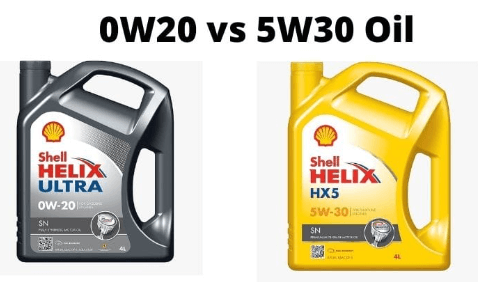In the world of engine oils, it’s important to understand the difference between various viscosities. One common question that often arises is whether you can use 0W 20 oil instead of 5W 30. In this article, we will delve into this topic and provide you with the necessary information to make an informed decision.
Understanding Viscosity Grades
Before we can answer the question at hand, it’s essential to comprehend what viscosity grades mean. The numbers in the oil’s viscosity grade represent its thickness and flow characteristics at different temperatures.
For instance, a 0W 20 oil has a low viscosity rating, which means it flows easily, even in extremely cold temperatures. On the other hand, a 5W 30 oil is slightly thicker and may not flow as well in colder conditions but offers better protection at higher temperatures.
Credit: www.quora.com

Credit: roadrize.com
Consult Your Owner’s Manual
When it comes to engine oils, it’s crucial to follow the manufacturer’s recommendations as outlined in your vehicle’s owner’s manual. The manual will clearly state the recommended oil viscosity grade for your specific make and model.
This information provided by the manufacturer is based on extensive testing and research, ensuring that your engine operates at its optimum level of performance and longevity. Straying from the recommended oil grade may have detrimental effects on your engine’s performance and can potentially void any warranty in place.
No Substitute for Thicker or Thinner Oils
It’s important to note that you should not use a thinner oil, such as 0W 20, if your owner’s manual specifies a thicker oil, like 5W 30. Thicker oils provide better protection for high-stress engines or engines operating in warmer climates.
Conversely, using a thicker oil when a thinner oil is recommended can lead to poor lubrication, increased wear and tear, and potential damage to engine components.
Advantages of Sticking to Manufacturer Recommendations
Following the manufacturer’s recommendations regarding oil viscosity grades offers several advantages. These include:
- Optimal engine performance: The recommended oil viscosity grade is tailored to your engine’s specific requirements, providing optimal lubrication and protection.
- Fuel efficiency: Using the correct oil grade can help maximize fuel efficiency, as engines are designed to operate efficiently with specific oil viscosities.
- Longevity: Adequate lubrication reduces friction and wear on engine components, prolonging their lifespan and reducing the likelihood of costly repairs.
- Warranty protection: If your vehicle is under warranty, using the recommended oil viscosity ensures compliance with the manufacturer’s guidelines, maintaining warranty coverage.
Expert Opinions
While it may be tempting to seek alternative opinions on the matter, it’s essential to rely on expert advice. Many reputable sources, such as automotive forums and websites, caution against using 0W 20 oil instead of 5W 30.
For instance, Bob is the Oil Guy, a popular resource for automotive enthusiasts, advises against using a thinner oil, stating that there are generally no advantages to doing so.
Additionally, the Reddit r/MechanicAdvice community and Toyota Nation Forum share similar sentiments, recommending sticking with the manufacturer’s recommendations for optimal engine performance and longevity.
Frequently Asked Questions On Can You Use 0w 20 Instead Of 5w 30
What Will Happen If I Use 0w20 Instead Of 5w30?
Using 0w20 instead of 5w30 can potentially cause issues if your owner’s manual recommends a thicker oil. It is not advised to use a thinner SAE grade or a thicker oil for a recommended thinner oil viscosity grade. Stick to the oil grade specified in your vehicle’s manual for optimal performance.
What Will Happen If I Put 0w20 Instead Of 5w20?
Using 0W20 instead of 5W20 is not recommended. If your owner’s manual specifies a thicker oil, using a thinner SAE grade or a thicker oil can cause issues with your vehicle’s performance and efficiency. Stick to the recommended oil viscosity for optimal engine function.
What Is The Difference Between 0w And 5w-30?
The difference between 0W and 5W-30 lies in their viscosities. 0W is thinner, providing better cold-start performance, while 5W-30 is slightly thicker, offering better protection at higher temperatures. Choose the oil recommended in your owner’s manual for optimal engine performance and longevity.
Can I Mix 0w-20 Oil With 5w-30 Oil?
No, it is not recommended to mix 0W-20 oil with 5W-30 oil. Mixing different viscosity oils can affect the performance and protection of your engine. Always follow the recommendations in your owner’s manual for the proper oil grade to use.
Can You Use 0w-20 Instead Of 5w-30?
No, it is not recommended to use 0W-20 oil if your owner’s manual calls for 5W-30. Using a thinner oil than recommended can affect engine performance and may void warranty.
Conclusion
In conclusion, it is not recommended to use 0W 20 oil instead of 5W 30 if your owner’s manual specifies the latter. Straying from the manufacturer’s recommendations can have adverse effects on engine performance, fuel efficiency, and overall longevity. Always consult your vehicle’s owner’s manual and follow the oil viscosity grade specified for your specific make and model. By doing so, you can ensure that your engine operates at its best, providing reliable performance and protection for years to come.




